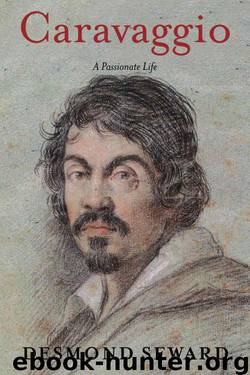Caravaggio: A Passionate Life by Seward Desmond

Author:Seward, Desmond [Seward, Desmond]
Language: eng
Format: epub, mobi
ISBN: 0688150322
Publisher: Thistle Publishing
Published: 2013-06-19T23:00:00+00:00
XIX
The First Baroque Pope, 1605
Clement VIII died in March 1605, and by the end of spring Paul V was pontiff. Clement is often described as the last of the Counter-Reformation popes, while Paul is sometimes called the first “Baroque” pope. This is an oversimplification. The Counter-Reformation remained very much alive even if the Baroque was in full swing by the end of Paul’s reign.
Despite Clement’s indecisiveness, he had been surprisingly successful, and not merely because of his saintly life and austere court. He had restored the Papacy’s political influence to an extent that had not been seen for centuries. France was saved for Catholicism, while both the French and the Spanish competed for Rome’s favor.
Inevitably, a papal conclave to choose a new pope was fraught with tension. So, too, was the entire city of Rome. Everyone knew that a completely new court with new favorites was about to emerge. From the moment the Cardinal Camerlengo took the Fisherman’s ring from the dead pontiffs hand, he ruled Rome in his place until the election of a new pope, and struck coins that bore his own name. In practice, during a conclave the city was virtually ungoverned. Armed guards were doubled outside the palaces, with chains placed across their gateways. A “Lantern edict,” ordering householders to place a light at a window each night, did little to deter wrongdoers. The sbirri were far too busy to worry about the brawls of Caravaggio and his friends.
The cardinals were divided into French and Spanish factions, and there was much lobbying. News of the surprisingly swift election on April 1 of the elderly Alessandro de’ Medici was greeted in Paris by fireworks and cannon fire. But the new pope, Leo XI, died before the end of the month, so the conclave reassembled. On May 16 it chose the mild-mannered, gentle-seeming Cardinal Borghese.
Like more than a few pontiffs, Camillo Borghese’s mild manners and gentleness soon vanished. In Ranke’s words, “immediately after his election, Paul V evinced a peculiarly rugged disposition.” From then on, Rome was to be ruled by an iron and seemingly merciless hand. A penniless, half-insane Lombard scholar had written a ridiculous parallel history of Clement VIII and Tiberius Caesar, comparing the late pope to the sinister Roman emperor. The manuscript stayed in his garret until he foolishly showed it to a woman in the same house, who denounced him. He was arrested with all Rome laughing at the story. There was a general impression that Pope Paul would take a lenient view, several people petitioning him to show mercy, but the wretched man was beheaded on the Ponte Sant’ Angelo, and his pitiful possessions were confiscated. Paul swiftly issued draconian edicts against loose women, swindling innkeepers, and those who spread false news. Gentlemen faced still sterner penalties for wearing swords. Although the edicts were largely ignored or evaded, everyone in Rome was uncomfortably aware of an unusually frightening presence on the papal throne.
Some historians believe that Caravaggio’s prospects were darkened by Paul’s election;
Download
Caravaggio: A Passionate Life by Seward Desmond.mobi
This site does not store any files on its server. We only index and link to content provided by other sites. Please contact the content providers to delete copyright contents if any and email us, we'll remove relevant links or contents immediately.
The Art of Boudoir Photography: How to Create Stunning Photographs of Women by Christa Meola(18629)
Red Sparrow by Jason Matthews(5475)
Harry Potter 02 & The Chamber Of Secrets (Illustrated) by J.K. Rowling(3677)
In a Sunburned Country by Bill Bryson(3543)
Drawing Cutting Edge Anatomy by Christopher Hart(3529)
Figure Drawing for Artists by Steve Huston(3451)
Harry Potter and the Prisoner of Azkaban (Book 3) by J. K. Rowling(3360)
The Daily Stoic by Holiday Ryan & Hanselman Stephen(3324)
Japanese Design by Patricia J. Graham(3178)
The Roots of Romanticism (Second Edition) by Berlin Isaiah Hardy Henry Gray John(2918)
Make Comics Like the Pros by Greg Pak(2918)
Stacked Decks by The Rotenberg Collection(2883)
Harry Potter and the Deathly Hallows (7) by J.K. Rowling(2725)
Draw-A-Saurus by James Silvani(2719)
Tattoo Art by Doralba Picerno(2670)
On Photography by Susan Sontag(2640)
Churchill by Paul Johnson(2587)
The Daily Stoic by Ryan Holiday & Stephen Hanselman(2579)
Drawing and Painting Birds by Tim Wootton(2511)
